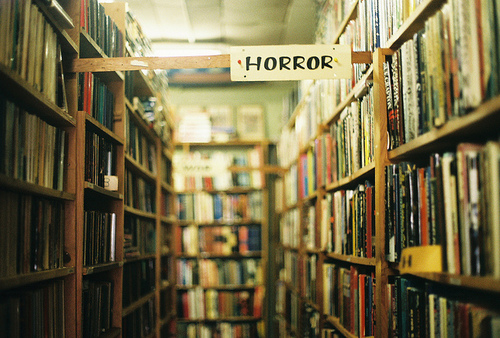 Nobody, it seems, wants to be associated with the “Horror” label. Far too many people appear to associate the word with lowest common denominator gore and shock. Never mind that horror is a term that has been in use for decades, if not centuries: to cite but one example, H.P. Lovecraft’s landmark 1927 study of supernatural fiction, which encompasses the work of iconic writers ranging from Edgar Allen Poe to Bram Stoker, is titled SUPERNATURAL HORROR IN LITERATURE (italics mine). Yet horror has nonetheless become a bad word for many, including the purveyors of such fare.
Nobody, it seems, wants to be associated with the “Horror” label. Far too many people appear to associate the word with lowest common denominator gore and shock. Never mind that horror is a term that has been in use for decades, if not centuries: to cite but one example, H.P. Lovecraft’s landmark 1927 study of supernatural fiction, which encompasses the work of iconic writers ranging from Edgar Allen Poe to Bram Stoker, is titled SUPERNATURAL HORROR IN LITERATURE (italics mine). Yet horror has nonetheless become a bad word for many, including the purveyors of such fare.
Nobody, it seems, wants to be associated with the “Horror” label.
In the late eighties-early nineties period especially it was chic to categorize horror-themed movies and books otherwise. In the words of Fangoria’s Michael Gingold, “Horror was looked down upon at that time, and people—even if they’d made a horror film—would say, “it’s not a horror film, it’s a supernatural drama,” or some such silliness.”

It was around then that the term “Dark Fantasy” was coined by either Charles L. Grant or Dennis Etchison, thoughtful and refined horror writers both. The Dark Fantasy tag—which admittedly sounded better than Grant’s previous self-imposed label “Quiet Horror”—actually caught on briefly with one publisher, White Wolf, many of whose mid-nineties publications were categorized as such. The late Richard Matheson also shunned the Horror label in favor of the apparently more benign “Terror.” He even got a publisher to go along with him: see Tor’s 2003 publication of the Matheson collection DUEL, which is subtitled “Terror Stories.”
“It’s not a horror film, it’s a supernatural drama.”
Then there are the literary sub-genres, like “gothic” and “splatterpunk.” Understandably, few writers wanted to be part of the latter category. This is evident in the pages of the Paul M. Sammon edited anthology SPLATTERPUNKS, whose contributors (as Sammon concedes in his introduction) by and large didn’t want to be labeled as such—David J. Schow, who’s credited with coining the word splatterpunk, opted out of the project altogether.
Gothic, on the other hand, is a far more convivial term, due apparently to its 18th Century origins. The term actually came back into vogue for a period in the 1970s, when it was used to categorize a succession of dark-hued romance novels, and again in a 1991 anthology entitled THE NEW GOTHIC, co-edited by Bradford Morrow and Patrick McGrath, that contained stories by highbrow writers like John Hawkes, Martin Amis and Jeanette Winterson (as well as Anne Rice and Peter Straub). I strongly doubt Morrow and McGrath would have been able to attract such writers had they used the H word, even though the “contemporary gothic fiction” on display in THE NEW GOTHIC is very much horror themed. So, for that matter, are the original 18th Century gothic writings—indeed, one of the most canonical examples of the form, Matthew Lewis’ THE MONK, can actually be viewed as a proto-splatterpunk novel.

Yet I think the anti-H word stance goes beyond mere terminology. Many horror-meisters, it seems, don’t want to be associated with the genre at all—and, given that this particular genre more than any other is looked down upon by connoisseurs of Serious Cinema and/or Literature (read: snobs), that stance may not be quite as self-defeating as it sounds.
Notice how the mainstream publishers of many top-tier horror scribes, such as Stephen King, Dean Koontz and David Morrell, consciously refrain from utilizing the horror label in their packaging. That’s also the case with writers like Brett Easton Ellis, who has written at least two straight-up horror novels—AMERICAN PSYCHO and LUNAR PARK—that aren’t categorized as such, and Joyce Carol Oates, who throughout the late 1980s and 90s wrote genre fiction under the pseudonym Rosamond Smith.
On the one hand the ruse is silly. Stephen King, after all, has become synonymous with horror fiction regardless of what appears on the spines of his books; ditto Dean Koontz and AMERICAN PSYCHO, while I can’t imagine there’s anyone in the literary world who doesn’t know the true identity of “Rosamond Smith” (the fact that the final Smith novel, 2001’s THE BARRENS, was credited to “Joyce Carol Oates writing as Rosamond Smith” kinda gave it away). Yet the rejection of the H word does appear to have yielded results, as the books of King, Koontz, Morrell, Ellis and Oates are consistently given places of honor on bookstore shelves (and bestseller lists), while those publications labeled as horror are not.
Yet the rejection of the H word does appear to have yielded results, as the books of King, Koontz, Morrell, Ellis and Oates are consistently given places of honor on bookstore shelves (and bestseller lists), while those publications labeled as horror are not.
Speaking of which, Ramsey Campbell once complained in an interview about his books being placed on bookstore shelves together with the likes of Shaun Hutson’s SLUGS and Guy N. Smith’s CRABS series—meaning, apparently, that Campbell was “competing with the worst in the field.” Putting aside the question of whether the SLUGS and CRABS books truly represent the “worst” of the horror field, I feel Ramsey Campbell and Guy N. Smith do belong on the same shelf. It’s a testament to the scope of the genre that it can accommodate both Campbell’s literate approach and the more pulpy stylings of Smith and Hutson. All three authors, after all, share the same goal: to scare.
Ultimately the drama surrounding the H word comes down to the never-ending struggle between high and lowbrow culture. This of course brings up another, more pertinent question: should horror, even taking into account the likes of SLUGS and CRABS, truly represent the low end of the equation? I say nay. As one late 1980s quote eloquently states, “Although some publishers may treat (horror) as second-rate literature…I don’t believe there’s any other kind of literature that has as much to say, or is as strong. Or as important.”
“Although some publishers may treat (horror) as second-rate literature…I don’t believe there’s any other kind of literature that has as much to say, or is as strong. Or as important.”
The author of that quote was the novelist Robert McCammon, who in the early 1990s elected to stop writing horror fiction, and famously took a decade-long sabbatical from publishing. Yes, even horror’s staunchest defenders are quick to abandon it, a problem I don’t see going away any time soon. But there may be hope: McCammon has resumed writing, and his recent novels, including THE FIVE, I TRAVEL BY NIGHT and THE BORDER, all proudly bear the horror label.
